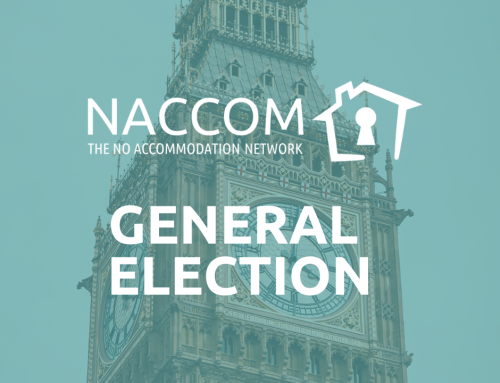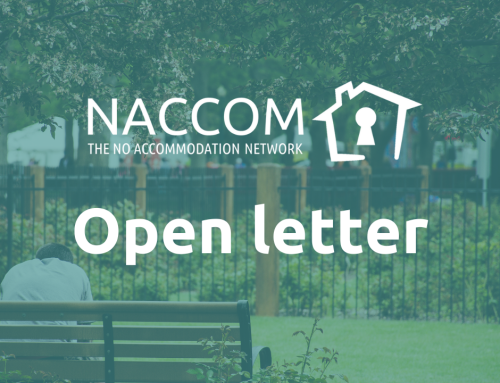Since 2013, NACCOM has gathered data from our members through our Annual Members’ Survey, which enables us to track the scale and impact of destitution in the asylum and immigration system.
This comprehensive data helps us to better understand and evidence the type of accommodation and support our members are providing across the UK, who the NACCOM network is supporting and what their needs are, and how responses to destitution are evolving each year. The information gathered underpins our advocacy and policy work, helping us to shape campaigns that will push for change to the policies that cause destitution.
In 2020-2021, evidence from our Annual Members’ Survey was presented in our Impact Report, and during the year used in key policy and advocacy work, including as part of evidence submitted to the Housing, Communities and Local Government Select Committee, the Home Affairs Select Committee, and National Asylum Stakeholder Forum. We also worked with partners and used the data to help inform and shape campaigns across health, anti-poverty and homelessness sectors to share concerns and make a case for reform, as well as highlighting key findings through our media work.
Widening the reach and depth of our survey
This year, for the first time, NACCOM is surveying all its members – both Full Members (who provide accommodation) and Associate Members (who provide support services). The decision to broaden the survey to include Associate Members has come in response to the changing external context we find ourselves in. The impact of Covid-19 on the sector has meant that many members have had to adapt and evolve the way that both accommodation and support is delivered, and our survey this year will help us to understand how service delivery and capacity is changing across the full network.
In addition, with the passing of the Nationality and Borders Bill, the need for more robust data to evidence the impact of hostile and inhumane immigration policy is greater than ever before. We hope that the inclusion of Associate Members going forward will provide a further evidence base to highlight the scale and harm of the Government’s approach to asylum and refugee protection.
Leon Elliott, NACCOM’s Policy and Research Co-ordinator, said:
A priority for NACCOM in the year ahead will be to use evidence from the network to resist the harmful proposals of the Nationality and Borders Act at the national policy level, and to help our members to influence change at the local level as well.
We hope that the additional questions on referrals and non-accommodation support that we’ve introduced to the survey this year will enable us to better map regional pathways out of destitution and the member services that make this possible. As we move towards a full dispersal model, understanding the availability of, and demand for, different support services across the UK could not be more important.
What does the survey look like:
The survey covers the type and amount of accommodation and support members offer, as well as questions on some key focus areas, including referrals and move-on outcomes. The survey questions are linked to NACCOM’s current goals to end destitution:
How can I use/access the data from the NACCOM annual survey?
The headline data from the 2021-2022 Annual Members’ Survey will be published in our annual Impact Report later this year at our AGM and Annual Conference (November), alongside a data bulletin, both of which are fully public and will be available to download from our website. For enquiries about accessing the full data set please contact [email protected].




